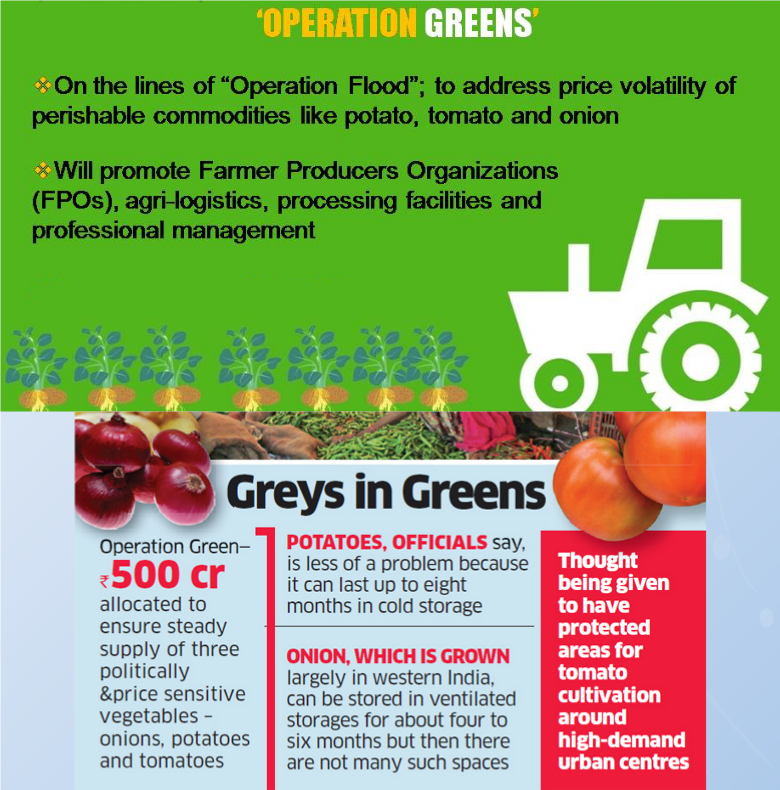

- Operation Green announced by the Union government in the Budget 2018-2019 has been approved by the government.
- As per the approval the scheme will be rolled out on pilot basis in 8 states.
Context
- Operation Green announced by the Union government in the Budget 2018-2019 has been approved by the government.
- As per the approval the scheme will be rolled out on pilot basis in 8 states.
About
Operation Green
- The immediate aim of the scheme is to contain the annual price distress of tomatoes, onions and potatoes (TOP) in regions with high production.
- The scheme aspires to increase the income of the farmers as in line with an ambition of doubling the farmer’s income by 2022.
- It aims to achieve these goals through interventions by encouraging farmer producers’ organisations, agri -logistics, processing facilities and professional management.
Components
Guidelines for the scheme have been prepared by the Union Ministry of Food Processing and Industries. The scheme has broadly two components, which are to be realised by 2020.
Short Term
- Price fixations to ensure farmers are given the right price for their produce. The minimum support price regulation has a key role to play in the short run.
- Transportation of vegetables from a surplus region to deficit region of production so as to provide good remuneration to the farmers at one hand and the affordable prices to the consumers on the other hand.
Long Term
- Creation of value chains in the surplus production areas,
- Infrastructure development for storage processing capacity to increase the shelf life of perishable horticulture crops.
- Processing industries in selected surplus regions.
Mechanism and funding
- The Expenditure Finance Committee approved an allocation Rs 500 crore by the Centre.
- Moreover, the committee suggested that extra funds can be pooled from schemes such as Scheme for Agro-Marine Processing and Development of Agro-Processing Clusters (SAMPADA), an umbrella scheme incorporating ongoing schemes related to
- Mega Food Parks, Integrated Cold Chain and Value Addition Infrastructure, Food Safety and Quality Assurance Infrastructure
- Infrastructure for Agro-processing Clusters,
- Creation of Backward and Forward Linkages,
- Creation / Expansion of Food Processing & Preservation Capacities.
- For short term component, a budget of Rs 50 crore has been allocated. Government will share 50 per cent of it with the National Agriculture Cooperative Marketing Federation of India (NAFED) for transportation and storage facility of TOP produces.
- For long term component, a budget of Rs 450 crore has been allocated. The budget will be used to develop value chain, cold storage, packaging, sorting, grading and processing industries.
- The top producing clusters are chosen keeping in mind value chain and processing industries. 17 clusters have been chosen in eight states.
Significance
- Farmers group like Farmer Producer Organizations, Farmers Federation, state undertakings or private players will benefit from this scheme as they will get 50 per cent of the total cost but up to Rs 50 crore.
- Although, tomatoes, onions and potatoes are consumed throughout the year across the entire country, farmers and consumers have incurred losses due to a lack of storage and transport facilities. This infrastructural component of the scheme will help in addressing this issue.
Pradhan Mantri SAMPADA yojana (Scheme for Agro-Marine Processing and Development of Agro-Processing Clusters:
The scheme is being implemented by Ministry of Food Processing Industries (MoFPI). It is a comprehensive package which will result in creation of modern infrastructure with efficient supply chain management from farm gate to retail outlet.
The following schemes are being implemented under PM Kisan SAMPADA Yojana :
- Mega Food Parks
- Integrated Cold Chain and Value Addition Infrastructure
- Creation/ Expansion of Food Processing/ Preservation Capacities (Unit Scheme)
- Infrastructure for Agro-processing Clusters
- Creation of Backward and Forward Linkages
- Food Safety and Quality Assurance Infrastructure
- Human Resources and Institutions
National Agricultural Cooperative Marketing Federation of India Ltd(NAFED)
- It was established in October 1958 and is registered under the Multi State Co-operative Societies Act.
- NAFED was setup with the object to promote Co-operative marketing of Agricultural Produce to benefit the farmers.
- Agricultural farmers are the main members of NAFED, and can also be members of the General Body of NAFED.
Learning Aid



